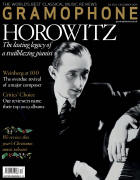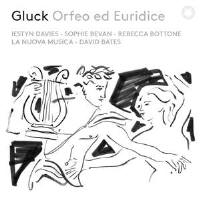Texte paru dans: / Appeared in: Pentatone
|
|
 |
Outil de traduction (Très approximatif) |
|
Reviewer:
Richard Lawrence I wish the booklet had named the singers and players of La Nuova Musica. The chorus has much to do, and I lost count of the number of times it ravished the ear. When the lament that opens the opera returns, it has a greater urgency. Similarly, the Furies’ first chorus is given extra momentum by the crescendo at the repeat of ‘sull’orme d’Ercole e di Piritoo’. When the spirits hushed singing gives way to a marvellous intensity in another crescendo before the music dies away. When the Blessed Spirits announce the arrival of Euridice the pastoral lightness is just right. I couldn’t detect any difference between the first time’s Andantino and the second’s Allegretto – which presumably implies a slightly faster tempo – but no matter. The orchestra, too, is extremely accomplished. There’s a delightful hint of portamento in the introduction to the first chorus (and again in the postlude). The horns are splendidly prominent, both in the ‘orribile sinfonia’ to Act 2 and in the minore sections of the second Ballo at the end. The dances are all played with fire or grace, as appropriate; and the flute, oboe and cello obbligatos in ‘Che puro ciel’ are beautifully phrased and perfectly balanced. (The recording producer is Gramophone’s Jonathan Freeman-Attwood.) The soloists are magnificent. Iestyn Davies sings smoothly throughout, hitting top Ds and Es with no sense of strain. He could show a greater sense of wonder when entering the Elysian Fields, but his grief in Act 1 and his encounter with the Furies are vividly conveyed. ‘Che farò’ is restrained, quite reasonably: it’s the Paris version that has the more emphatic, desperate conclusion. Euridice appears only in Act 3. Sophie Bevan comes across powerfully, getting more and more stroppy as she rails at Orfeo for not looking at her. Rebecca Bottone has a perfect voice for Amore (Cupid), light and bright. ‘Gli sguardi trattieni’ is taken more slowly than usual: the tempo suits the words but not, I think, the tune. High praise, then, for David Bates and his ensemble. This is a serious rival to the excellent Sony recording conducted by Frieder Bernius, with Michael Chance, Nancy Argenta, the Stuttgart Chamber Choir and the Canadian orchestra Tafelmusik. |
|




